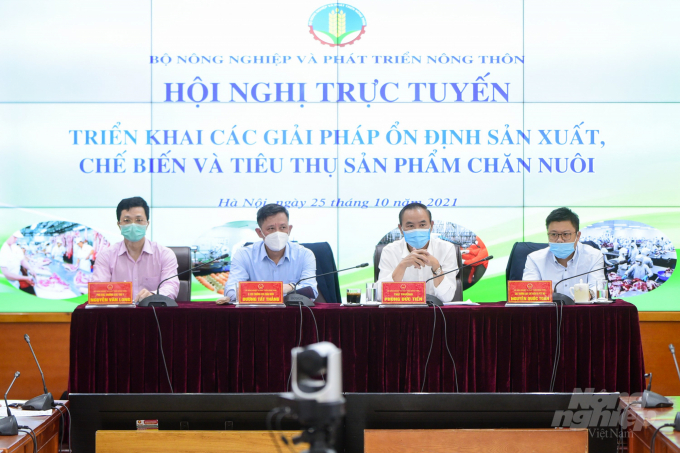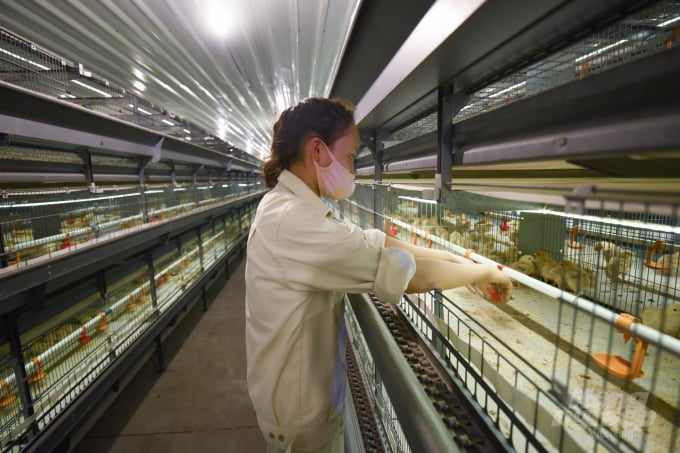May 20, 2025 | 21:44 GMT +7
May 20, 2025 | 21:44 GMT +7
Hotline: 0913.378.918
May 20, 2025 | 21:44 GMT +7
Hotline: 0913.378.918

On October 25th, Deputy Minister of Agriculture and Rural Development Phung Duc Tien chaired an online conference to deploy solutions to stabilize the production, processing and consumption of livestock products. Photo: Tung Dinh.
On October 25th, Deputy Minister of Agriculture and Rural Development Phung Duc Tien chaired an online conference to deploy solutions to stabilize the production, processing and consumption of livestock products.
According to the Department of Livestock Production, in the past nine months, the total output reached over 4.7 million tons of pork, over 12 billion eggs and nearly 900,000 tons of milk. The livestock sector’s production value is estimated to increase by 4.2%.
The Covid-19 epidemic caused many provinces and cities across the country to implement social distancing, so the demand for food has decreased significantly by 30-50% in Hanoi and Ho Chi Minh City.
The epidemic also disrupted a series of production and supply chains, causing the price of input materials to increase especially animal feed (up by 16-36%), while the output price is very low. There was a short period when livestock products were sold with the price of only 25-30% of the cost. White industrial chicken is an evident example.
Despite all these facts, the price of pigs and chickens for slaughter is expected to rise again in the next two weeks since the Covid-19 epidemic is under control.
Deputy Minister Phung Duc Tien affirmed that product backlog is unexpected and unpredictable, but this is a normal phenomenon in production and distribution. The prerequisite solution is therefore good prevention of Covid-19 and the best answer is vaccination. Deputy Minister Phung Duc Tien said that it is necessary to request the Government and local People's Committees to allocate vaccines for the agriculture sector’s human resources.
As stated by the Deputy Minister, the matter of connecting supply and demand needs further promotion. This might solve the problems raised by practice in the current context. Mr. Phung Duc Tien affirmed: “There was a very clear effect when the Working Group 970 actively connected supply and demand for the southern provinces. The MARD will proactively work with the Ministry of Industry and Trade to make more progress in this matter.”
Regarding processing, the Deputy Minister assessed that the Southeast region is an area with great potential for livestock and processing development, but the current development speed is still slow.
“The state can support infrastructure, but investment requires enterprises. The provinces must at least have investment to the end of the work to create favorable conditions for development, not to mention it must be associated with the raw material area," said the Deputy Minister.
Deputy Minister Phung Duc Tien emphasized: “connection means strength”. In the next two to three years there will be many large-scale livestock production chains with a standard scale of goods ratio.

Deputy Minister Phung Duc Tien affirmed that in the next two to three years there will be many large-scale livestock production chains with a standard scale of goods ratio. Photo: Tung Dinh.
Translated by Samuel Pham

(VAN) Khanh Hoa is investing over 545 billion VND to develop 240 hectares of high-tech marine aquaculture in order to guarantee a consistent supply of seafood exports and achieve the USD 1 billion target.

(VAN) Minister of Agriculture and Environment Do Duc Duy held a meeting with Soopakij Chearavanont, Chairman of C.P. Group, on May 15.
/2025/05/16/3800-0-nongnghiep-143756.jpg)
(VAN) Suntory PepsiCo Vietnam coordinated with the Ministry of Education and Training to implement an education program on water conservation, reaching nearly 1 million primary school students nationwide.

(VAN) Vietnam’s TH Group officially put its high-tech fresh milk processing plant into operation in the Russian Federation, marking a historic moment as the first TH true MILK cartons were produced in Russia.

(VAN) Use of high-quality broodstock and biotechnology is regarded as the most effective approach to ensuring sustainable and economically viable shrimp aquaculture ahead of climate change and the emergence of increasingly intricate disease patterns.

(VAN) Carbon farming is a form of agricultural practices that helps absorb more greenhouse gases than it emits, through smart management of soil, crops, and livestock.

(VAN) This is a key content of the Memorandum of Understanding recently signed between the Vietnam Fisheries Society and Kunihiro Inc of Japan.